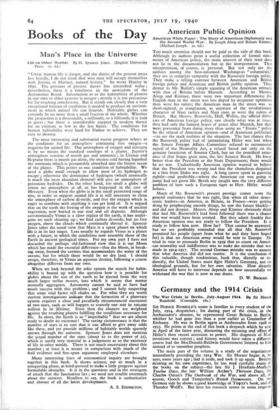Books of the Day
Man's Place in the Universe
" UNTIL human life is longer, and the duties of the present, press less heavily, I do not think that wise men will occupy themselves with Jovian, or Martian, natural history." So wrote Huxley in 1892. The pressure of present duties has intensified today ; nevertheless, there is a timeliness in the unwisdom of the Astronomer Royal. Information as to the habitability of planets in our own or other systems is meagre ; mostly it is too precarious for far-reaching conclusions. But it stands out clearly that a very exceptional balance of conditions is needed to produce an environ- ment in which animal life can flourish. Habitable globes can certainly be no more than a small fraction of the whole. Whether the proportion is a thousandth, a millionth, or a billionth, it is rash to guess ; but there is considerable support in modern theory for an estimate as low as the last figure. The conditions for human habitability were hard for Nature to achieve. They are easy to destroy.
The most interesting and substantial recent progress relates to the conditions for an atmosphere containing free oxygen—a requisite for animal life. Our atmosphere of oxygen and nitrogen is by no means the standard envelope of a planet. Jupiter's atmosphere consists of marsh gas and ammonia ; in Uranus and Neptune there is marsh gas alone, the intense cold having liquefied the ammonia which is presumably absorbed into the frozen ocean of the planet. This points to one condition of habitability. We need a globe small enough to allow most of its hydrogen to escape ; otherwise the dominance of hydrogen (which cosmically is much the most abundant element) will give an atmosphere of poisonous hydrides. On the other hand, too small a globe will retain no atmosphere at all, as has happened in the case of Mercury. Even when the globe is in the small permitted range of size, in order to support animal life it is still necessary to clean the atmosphere of carbon di-oxide, and free the oxygen which is eager to combine with anything it can get hold of. It is argued that on the earth the freeing of the oxygen is the work of ancient• vegetation, now buried in our coal and oil deposits. Although astronomically Venus is a close replica of the earth, it has under- gone no such cleaning up ; we find carbon di-oxide, but no free oxygen, above the clouds which continually shroud it.- Spencer Jones takes the usual view that Mars is a spent planet on which life is in its last stages. Less usually he regards Venus as a planet with a future, in which the conditions now resemble those of the Earth in ancient geological times. For my own part I have not discarded the perhaps old-fashioned view that it is our Moon which has made the essential difference—that the Moon, in break- ing away, formed the eavities- that aceorrunodate the water of the oceans, but for- which there would be no dry land. I should assign, therefore, to Venus an aqueous destiny, following a course altogether different from our own.
When we look beyond the War, system.. the search for habit- ability is bound up with the question how it is possible for globes about the size of the earth to be ejected from the very much larger stellar masses, into which it seems that matter normally aggregates. Astronomy cannot be said to have had much Success with this problem ; and I cannot help suspecting that some vital factor still eludes us. For what they are worth current investigations indicate that the formation of a planetary system requires a close and peculiarly circumstanced encounter of two stars, such as will happen to scarcely one star in roo,000 million in its lifetime. Even then the chances are weighted against the resulting planets fulfilling the conditions necessary for rife. In short, the Earth is' so " improbable " that we are almost ready to doubt its existence! The saving circumstance is that the number of stars is so vast that it can afford to give away odds like these, and yet provide millions of habitable worlds sparsely strewn through the universe. Spencer Jones does not mention the actual number of the stars (about ro to the power of 22), which is surely very material to a judgement as to the existence of life in other worlds. There is not much uncertainty about this number ; at least it is secure in comparison with much of the frail evidence and fine-spun argument employed elsewhere.
Many interesting lines of astronomical inquiry are brought together in this book. It shows science, not so much in a conquering phase, as hard-pressed to make a little progress against formidable obstacles. It is in the questions and in the stratagem of attack that the fascination lies ; we need not trouble overmuch about the answers. Needless to say, the book is authoritative and abreast of all the latest developments.
A. S. EDDINGTON.


































 Previous page
Previous page